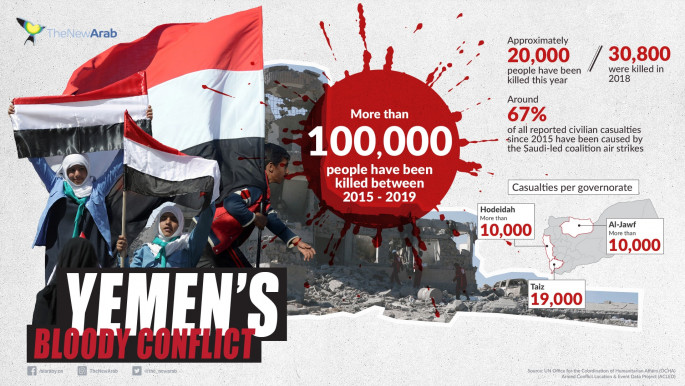Houthis will have role in Yemen's future, UAE says, nearly five years into deadly war
Yemen's rebels will have a role in their country's future, a UAE minister said on Sunday, voicing optimism that a recent peace deal between the government and southern separatists could lead to a wider solution.
Anwar Gargash, minister of state for foreign affairs in the United Arab Emirates - a key member in the Saudi-led coalition backing Yemen's government against the Houthis - urged all sides to maintain momentum for a political solution.
"Such an agreement must take account of the legitimate aspirations of all parts of Yemeni society. That includes the Houthis," Gargash said at a political conference in Abu Dhabi.
"Houthi militias have wreaked havoc on the country, but they are a part of Yemeni society and they will have a role in its future.”
The comments were the latest conciliatory move in the long-running Yemen conflict, after the Iran-backed Houthis offered in September to halt attacks on Saudi Arabia.
The Houthi rebels have been fighting the internationally recognised government and its allies for more than four years in a war that has pushed the country to the brink of famine.
Read more: UAE's true ambitions in Yemen take another blow
But Gargash said he was hopeful that a power-sharing deal between the government and the secessionist Southern Transitional Council, inked in Riyadh last week, could pave the way for a wider peace deal.
"The agreement solidifies the anti-Houthi coalition and provides a more robust basis for reaching a political solution," he said. "Now we need to build on the momentum this has given us."
The so-called Riyadh agreement would see Yemen's government return to Aden and place the forces from both sides under the authority of the defence and interior ministries.
Yemen's exiled government and southern separatists will host their first meeting in Riyadh on Thursday, two days after the signing of a peace deal aimed at sustaining stability between the conflicting factions.
A spokesperson for the Southern Transitional Council (STC) released a statement saying his group was set to enter talks with the Saudi-based government of President Abedrabbo Mansour Hadi on Thursday.
The talks will aim to "cooperate with President Hadi under the auspices and guarantee of the Arab Alliance, in order to improve services and address issues in the southern regions of the country", Nizar Haitham said.
Read more: Iran blasts Riyadh peace agreement as 'legitimising Saudi occupation in Yemen'
The crisis in Aden heightened in August, when separatists completed a coup against legitimacy by moving to take military control of the temporary, after days of clashes, which saw dozens killed and injured from both sides. The Yemeni government accused Abu Dhabi of being behind the "insurgency."
Security Belt Forces - dominated by the STC - in August took control of Aden, which had served as the beleaguered government's base since it was ousted by the Houthi coup.
The clashes between the separatists and government forces, who for years fought on the same side against the Houthis, had raised fears the country could split into two entities.
The STC then expelled internally-displaced Yemenis from the north of the country seeking refuge from the ongoing violence.
"We do believe among those migrating south there are some planted by certain political groups", Mohamed Alsahimi, deputy head of the STC's UK office told The New Arab at the time - accusing some refugees being planted to instigate instability in the country’s south.
Meanwhile, Gargash’s comments came after a rally organised by the Houthi insurgents to mark the birthday of the Prophet Mohammed on Saturday drew hundreds of thousands in the Yemeni capital Sanaa, a much larger crowd than last year.
Rebel chief Abdulmalik al-Houthi addressed the crowd via a video message played on a large screen, while many chanted slogans in support of the insurgent leader.
The rebels took Sanaa in 2015, after which Saudi Arabia, the UAE and their allies intervened in the conflict in support of President Abedrabbo Mansour Hadi.
Since then, more than 100,000 most of them civilians - have been killed in a conflict that has triggered what the United Nations has described as the world's worst humanitarian crisis.
Follow us on Twitter and Instagram to stay connected!



